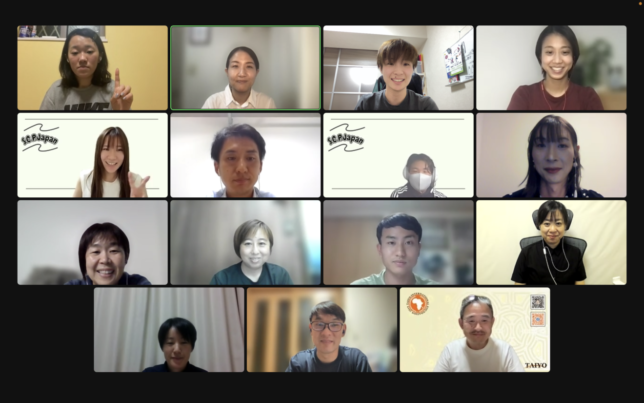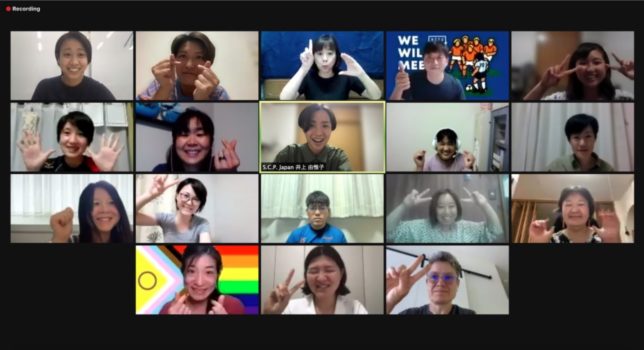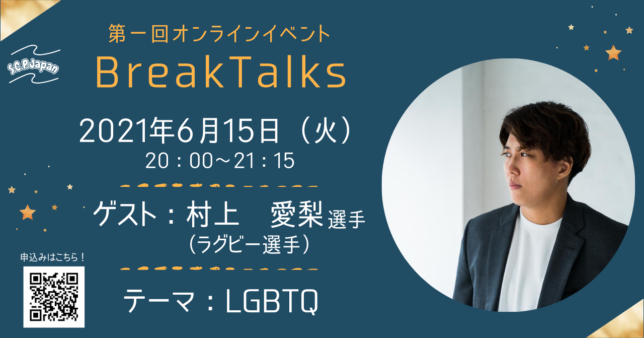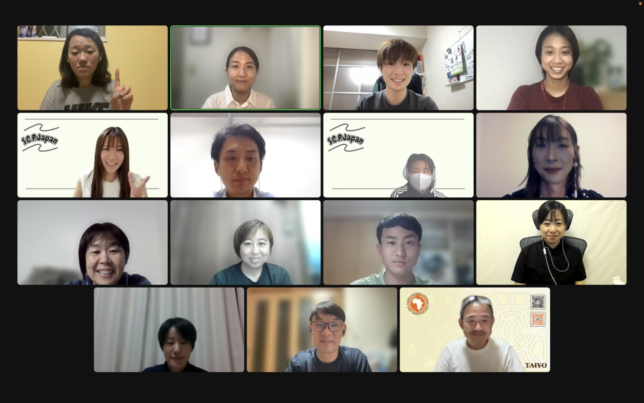
On Wednesday, June 29, S.C.P Japan held a fifth BreakTalks. This time, we invited Ms. Shuna Matsumoto, who has been working as an athletic performance coach in Y.S.C.C Yokohama (as of June 2022), as our guest speaker. She was born in Germany, and after learning about coaching in Germany and the United States, she has been a track and field coach as well as an athletic performance coach for over 20 years. In 2020, she publicly came out as a trans woman (*1).
This time during BreakTalks, Ms. Shuna shared with us her experiences and perspectives, working life, and things that are important in the sports fields and society for a while. Her story made everyone discuss a few topics such as “Transgender and Sports” and “Transgender and Society.”
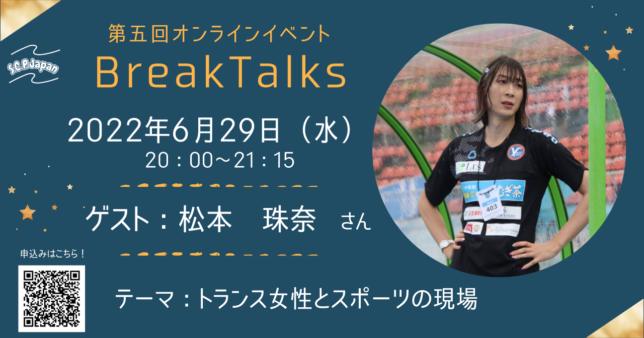
Before the guest talk, Orime, a member of S.C.P Japan, explained the current situations/facts and issues related to “Trans women and Sports Field.”
In November 2021, the IOC announced a new framework related to the participation of transgender athletes in sports: “IOC Framework on Fairness, Inclusion, and Non-Discrimination on the Basis of Gender Identity and Sex Variations.” In this framework, the IOC stated that there would be no regulations that would define the common criteria for gender categories for each sport with regard to the participation of athletes in competitions. This new framework also stated that each sport and its governing body would determine the criteria, taking into account the nature of each sport. As an example, the recent new rule of the International Swimming Federation (FINA) on the participation of transgender people was presented, which resulted in the limitation of the participation of transgender women in the women’s category.
In addition, we touched on the participation of LGBTQ+ (*2) people whose sports skills are at a general level. Due to the lack of sufficient knowledge about LGBTQ+ individuals and the structure and mechanics of sports based on gender binary, LGBTQ+ youth, especially nonbinary (*3) youth, there have been reports of lower participation in sports.
Looking at these facts, we can say that the participation of LGBTQ+ people in sports still has a lot of challenges. On the other hand, the Tokyo Olympics not only featured 222 LGBTQ+ athletes (as of August 2021), but Laurel Hubbard became the first transgender athlete to compete at the Olympics in the gender category to that which they identify with.
Hubbard’s participation in the Tokyo Olympics visualized transgender people, as she became a role model for young people, bringing diverse communication among sports fields and society. Through the game, LGBTQ+ athletes, including Hubbard, conveyed a lot of messages for the future of the sporting world and youth.
Afterward, Torizuka, who has been working for S.C.P. Japan as an intern, interviewed the guest speaker, Shuna Matsumoto, about her experiences, thoughts, and feelings that led her to officially come out as a transwoman, as well as things that she would like to see in today’s society and sports world.
*1 Transgender is a term that refers to people who feel a discrepancy between the sex they were born with and the sex they self-identify. Among them, people who wish to be closer to their true gender both physically and mentally are called transsexuals. Trans women mean transgender, including transsexual, whose physicality as male and their gender identity as female do not match.
*2 LGBTQ+ takes the initials that stand for Lesbian (a person who identifies as a woman or feels a connection to womanhood who is attracted to women.), Gay (a person who identifies as a man or feels a connection to manhood who is attracted to men), Bisexual (a person who is attracted to two or more gender identities), Transgender (a person whose gender identity does not match their sex assigned at birth.), Queer (a person whose gender identity or sexual orientation does not correspond to established ideas of majority), Questioning (a person who does not know, cannot decide, or does not decide their sexual orientation or gender identity), and + (plus) represents the diverse range of sexualities and gender identities that do not fit into the LGBTQ categories listed above.
*3 Nonbinary refers to a person who does not identify their gender within the binary gender system (i.e. woman/man).
Ms. Shuna’s Sports and Coaching Experiences
“When I was 12, I started track and field in Germany, where I spent my childhood. As Germany has good coaching licensing systems, clubs whose coaches have the license earn high reputations, which leads to an increase in club membership, and some areas offer subsidies for coaches with the license, teams are active to develop coaches.
Having played track and field in such a good environment, I worked as an assistant for coaches in the club that I belonged to from the age of 14. With a main coach, I earned coaching knowledge and skills through first-hand experiences in the club. After that, I studied coaching at Athletes’ Performance (now EXOS) in the United States. Several policies of the organization such as “training that never makes a difference between men and women” and “the focus on training a move rather than muscles” inspired me to study coaching there. I believe my duty and importance of coaching is to develop players I taught to a level in which the players can become coaches.”
The Process of Coming Out and the Reactions of People around Her
In my childhood, I was not really thinking about my gender identity (Gender identity: a person’s internal, deeply held sense of their gender. It doesn’t necessarily correspond to one’s physical structure.). That is partly because people around me naturally accepted my long hair and pretty, girlish face. My unestablished gender identity has changed to female as I grow up. Having revealed my gender identity in Germany, I worked as a woman for a year. However, since I had not made big results in my work and I was facing many other challenges at the time, I gave up telling people around me about my gender identity. Then I moved to Japan in 2013. The new life in Japan was hard, but I noticed that I could be myself when wearing skirts. On the other hand, though I had been wearing makeup and nails for some time, I was anxious about what everyone would think of me and lived my life always thinking of reasons for wearing makeup, such as using foundation to cover rough skin, so I could explain when I was asked about it. Even doing so, I still wanted to come out, and around the second year at Y.S.C.C Yokohama, I slowly began to live my life a little more openly by posting pictures on Instagram that everyone would realize that I’m a transgender and by wearing more makeup than before.
While thinking about when to express my feelings at Y.S.C.C Yokohama, the head coach brought it up to me first, and the process naturally led me to come out. After that, the head coach explained to the club. I also learned later that the head coach had explained my gender identity to the players without my knowledge. The other male coaches at the club might be considerate of me and would not come in when I was changing in the locker room. Y.S.C.C. Yokohama has players with diverse backgrounds. Maybe that’s why I feel that the team is willing to accept people from all walks of life and not be critical or conservative with people, including me. ”
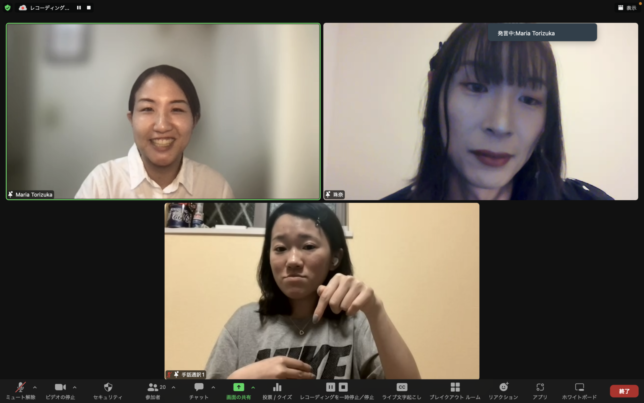
Transgender Athletes and Sports
“When I was doing track and field, I had no aversion to play as a male athlete. Even now, I have a desire to compete in the men’s category when I do athletics. In the mixed events in track and fields that I was working on, the number of events were different based on gender: decathlon for men and heptathlon for women. I prefer decathlon to heptathlon, for decathlon has more events and I am more used to it. I would like to participate in the decathlon as a female athlete, if possible. Also, in track and field, both men and women train together and work off the same training menus. So, I never felt uncomfortable about gender. In addition, while doing athletics, I never thought about my gender identity as I was so focused on the competition (This may be different from other transgender people).
I am openly transgender. Being a transgender does not prevent me from doing my job because I can compete as a coach regardless of gender thanks to my record as an athlete and coaching achievements to this day. On the other hand, athletes may not be able to continue competing due to the “gender” category, so trans athletes are in a really hard situation. However, we can change these situations in a lot of ways such as changing rules and establishing clear rules about gender categories.”
After the guest talk session in the first half, the second half was dedicated to participants’ interaction with each other through an active exchange of ideas and opinions.
Ms. Shuna left a comment saying, “LGBTQ+ people also live their lives naturally. If the people around them could accept the behavior of LGBTQ+ people as natural, without treating them differently because they are lesbians or transgender, and then discrimination against others would not arise.”
She also commented, “society sometimes puts restrictions on jobs that only women can do or men can do, but if people with abilities can get jobs regardless of gender, society will change. For example, in the profession of coaching, the training menu and methods do not differ between women and men. She also touched on the way she interacts with others, commenting, “When I teach kids in a club, professional athletes, athletes who have participated in the Paralympics and won medals, I always feel that I am teaching ‘athletes’regardless of disabilities or ages.”
We would like to express our sincere thanks to the 15 participants from different backgrounds and to all those who were involved and supported the event.
We also would also like to extend a sincere and big thank you to Ms. Shuna for participating in this event and sharing her story and thoughts, with the volunteers, sign language interpreters, and all the participants.

